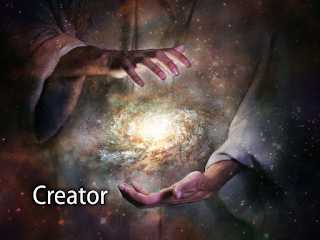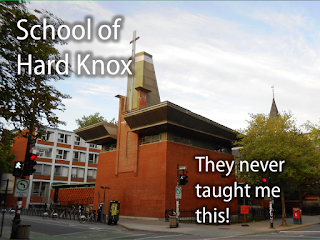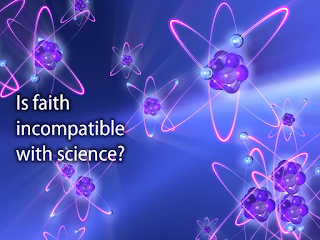Hespeler, February 11, 2018 © Scott McAndless
Genesis 1:1-8, John 1:1-14, Psalm 148:1-14
| I |
am sure that many of you are familiar with Dan Brown, author of bestselling books such as The DaVinci Code. His books and the movies that have been made of them have been incredibly popular in recent years. In an interview that took place to promote one of his books someone asked Brown the question, “Are you religious?” this is what Brown said:
“I was raised Episcopalian, and I was very religious as a kid. Then, in eighth or ninth grade, I studied astronomy, cosmology and the origins of the universe. I remember saying to a minister, ‘I don’t get it. I read a book that said there was an explosion known as the Big Bang, but here it says God created heaven and earth and the animals in seven days. Which is right?’ Unfortunately the response I got was, ‘Nice boys don’t ask that question.’ A light went off, and I said, ‘The Bible doesn’t make sense. Science makes much more sense to me.’ And I just gravitated away from religion.”
And I must say that I find it rather appalling that Dan Brown, a man who is clearly smart and very interested in spiritual and religious matters (many of his books explore deeply spiritual and religious questions even if some of the history is not overly accurate) – that Dan Brown should have been turned off from the church like that.
Christians do proclaim and praise God as the Creator. It is an essential part of our belief system but it is not, I think it is important to say, just an explanation. This isn’t something that believers came up with simply because they didn’t have a better explanation for how everything came to be. The idea that this God, who we have come to know through Jesus, is the author of everything that exists is absolutely central to our relationship with this God and to the hope that we find in knowing him.
I think that that was the first mistake that that Episcopalian minister made when talking to that intelligent young Dan Brown. To him, there was something scary about Brown’s question. The young man came in with an understanding of how the world and all that is in it came into being, a powerful story backed up by science and evidence and supported by a consistent theory. And that poor minister knew that, while he also had a good story of creation, his story did not have those kinds of theoretical or practical supports behind it. He felt that he had to defend his story but he knew that he didn’t really have the ammunition to put up any sort of reasonable defence. So he resorted to what the Christian faith has resorted to far too often down through the years: he shut down the questioner.
Even worse he suggested that there was something wrong with Brown simply because he had asked the question – insinuating that he wasn’t “nice.” I don’t blame Brown for being turned off, but I am afraid that, in overt and subtle ways, we continue to turn all sorts of people off who bring in their questions and their reasoning to challenge our idea of a creator God.
But that minister didn’t need to be intimidated by that question. The mere fact that other people – physicists, cosmologists, biologists – can find excellent ways to explain how everything came to be, is not a direct challenge to our concept of a divine Creator. That is because the Creator we meet in the Bible is not about the how of creation, the Biblical Creator is about the why.
That is why, for one thing, there is not just one account of creation in the Bible. There are several stories that give very different spins on what happened and especially how it happened. There is the best-known story from Genesis 1 that we read from this morning – the famous seven-day story. That story is about the who of Creation – identifying over and over the Creator as Elohim, the God of Israel. We miss that, of course, because the name Elohim is translated throughout simply as God. But the naming of the creator in this saga would have been deeply significant to the people who first heard it because what this story was teaching them was that the God, Elohim, that they had come to know through their worship and in their prayers was the same God who had called the universe into being.
This story is also about the why of creation. It was saying – and this also is something that it repeats over and over again – that God created the world because it was good and that there was a goodness in how God had organized the whole thing – separating light from darkness, water from water and organizing everything from times and seasons to the various groups of animals according to their kind.
The why of the story was also about teaching the people of Israel about their own time – specifically that they were to organize their time into groups of seven days and that every seven days they were to observe a Sabbath just as God had done by resting after six days of labour in creation. That is why the creation story all takes place in six days – it wasn’t really about how long it took for God to create the world, it was about how the people were to live out their lives in the world in weeklong cycles.
What this creation story is not particularly concerned about is how it all came about, at least not as we would see it from a modern scientific point of view. We should hardly expect it to because that was not a concern of the people for whom this story was written. That is a modern, post-enlightenment way of answering the question of why everything exists. This story was concerned, from the point of view of the people it was written for, with much more important matters.
One thing that makes this very clear is the fact that the Bible didn’t limit itself to one account of creation. After the first story – the seven-day story – there is another story of creation that is told in the second chapter of Genesis – a story of a man named Adam and woman named Eve in a garden. This is no less a creation story than the first one. This is sometimes smoothed over in translation, but the original text very clearly recounts the creation of the world and the plants, animals and people all over again.
This, again, didn’t really bother the people for whom it was written. They understood that the story was being told in different terms because it was finding a different meaning in the creation and in the Creator. Here the focus was on relationship – the relationship of the humans to the natural world, the relationships between men and women and above all the relationship between God and humans. So, once again, it wasn’t about the mechanism of creation so much as about the meaning of creation.
So, unlike that Episcopalian minister who spoke to that young Dan Brown, I don’t see any need to be fearful or defensive about the apparent contradictions between scientific explanations of how the universe came to be and how the Bible talks about the topic. I feel that all of these accounts are valuable if you understand what they were written to convey and use them accordingly.
But there is another Biblical creation account that I would like to focus on for a few minutes – one that might help us to bridge the divide between Biblical and modern approaches to understanding the existence of everything. When the Gospel of John was written (and most scholars think that it likely wasn’t written until maybe a century after the death of Jesus) the author probably thought long and hard about how he would begin his account of the life and ministry of Jesus of Nazareth. Other gospel writers (Matthew and Luke) had started with stories of Jesus’ birth. Mark had started with Jesus getting baptised. But the writer of John felt that he needed to go much farther back to get to the real start of his story. He started with a new account of creation.
This new creation story starts out with a nod towards one of the old ones. The first words, “In the beginning,” are lifted directly from Genesis 1:1. But from there it takes a strange turn. Instead of “In the beginning God,” we get, “In the beginning was the Word.” Now even there we can see a connection with the Genesis story because, of course, in Genesis God creates by means of the spoken word, by saying things like, “Let there be light” and “Let there be a dome.”
But the gospel writer is saying more than just that God created by speaking – a whole lot more. The word that he uses there – the word that is translated word is a Greek word: logos. And logos is not just another Greek word that means word. It is a word that takes us to the heart of the ways in which Greek thinkers at that time thought and understood their world. For the Greek philosophers, the logos was the organizing principle for everything that existed. If you grasped the logos, you could understand and explain everything. That is why, to this very day, many of the words that we use to talk about how we think and understand the world – words like logic, biology, archaeology and cosmology all contain within them the root logos.
Now, this whole Greek mode of thinking and understanding by analysing and defining the world was very new and strange to the people that had produced the Bible up until that point. I am sure that many would have said that these Greek modes of thinking were standing in direct opposition to everything that the Bible had said about God and the world that God had created up until that point, just as today there are some who say that the way that science understands the universe is an affront to the Biblical truths that the church has always proclaimed.
But what I find very interesting is that the writer of the Gospel of John did not say that. Instead of holding up the Biblical story of creation in opposition to the Greek ways of thinking and understanding in order to say, “We’re right and you’re wrong,” he told a new creation story where he embraced the Greek concepts and language. He told a story of how God used the logos, the organizing principle of Greek philosophy, to bring all things into existence: “He [the logos] was in the beginning with God. All things came into being through him, and without him not one thing came into being.”
But the gospel writer does something even more astounding than that with his brief creation story. He is actually able to identify this Greek concept of logos, which he sees at work in the very act of creation, with the Christ that he has come to know and about whom he is writing this Gospel: Jesus of Nazareth. “And the logos became flesh and lived among us, and we have seen his glory, the glory as of a father’s only son, full of grace and truth.”
Now, some might accuse John of stealing concepts from Greek thinkers and using them to slip some Christian gospel message to Greek thinkers, but I don’t think that that is what he is doing. I believe, instead, that he has genuinely listened to these Greek thinkers and has discovered that their different way of looking at the universe and how it can be understood has led him to a deeper understanding of the Christ that he calls Lord.
And maybe the best thing we can do is to follow John’s example. When we, as modern Christians are faced with new ways of understanding the cosmos and its origins – ways that were not necessarily anticipated in our original sacred texts – we have no need to react with defensiveness or fear. People of faith have been running into this issue for quite some time. And some of them, who were writing down the Bible, did not hesitate to rethink and retell the creation stories that they had received so that they might better take into account the new priorities and ways of thinking that they had encountered. This was not a denial of what they had known before but an enhancement and a new richness.
And the writer of the Gospel of John even found that this exercise took him deeper into the mystery of the Christ that he worshipped. So why wouldn’t we, by rethinking our understanding of the origins of all things in the light of the stories that science gives us, be drawn into a deeper understanding of God our Creator and sustainer. That is what a good creation story is supposed to be there for, isn’t it?














